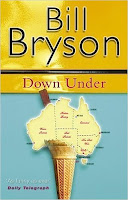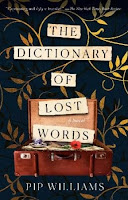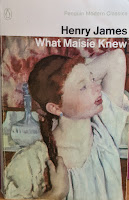What Maisie Knew by Henry James
When I read Henry James I am either delighted with his writing or flat out irritated with it and him. The Wings of the Dove for example was an exhillarating reading experience, while What Maisie Knew was both great and greatly irritating. I know that the mood I bring to a book can influence how I react to it, but seriously, what does "His allusion to this meal gave her, in the shaded sprinkled coolness, the scene, as she vaguely felt, of a sort of ordered mirrored license, the haunt of those - the irregular, like herself - who went to bed or rose too late, something to think over while she watched the white-aproned waiter perform as nimbly with plates and saucers as a certain conjurer her friend had in London taken her to a music-hall to see." even mean?
I usually enjoy figuring out his convoluted word mazes but for some reason I found myself grumbling my way through this one. Maybe I was in too much of a hurry to appreciate his tendency to use 74 words where 12 might do, but whatever the reason, I think I'll wait awhile before I tackle another one. He's been one of my favourite authors for a long time and I don't want to mess that up.
As for the story, Maisie is the little girl through whose eyes it is seen. Her mother and father, narcissistic jerks who can't stand each other, don't have the time or the inclination to look after her. They split up and re-marry, then those new relationships fall apart and the new husband and new wife get together, creating a very complicated situation indeed.
Poor little Maisie gets shuffled back and forth among all these adults and has to listen to each of them complaining about the others, even being required to pass on insults when she leaves one home for the next. The question of who will raise her isn't answered till the very end and when it did come it didn't make a lot of sense. Yes, it was a different time and place, but surely there must have been some protections in place for children. Could parents simply decide not to raise their child and give her away to anyone who was willing to take her? And I can't believe any adult would let a child make the final decision about guardianship based on that child's ultimatum, no matter how well-meant the ultimatum was.
Despite being rejected by her parents, Sadie maintains her good attitude through all the changes, and it's a good thing because she's the only character who's likeable at all. Her step-father, Charles, has potential but in the end he turns out to be as flaky as the rest of them. There aren't many people in this story to admire.
Having said all that, I am glad I read it. Henry James' dizzying wordiness may annoy me now and again, but most of the time I'm simply in awe of his brilliant use of the English language, the beautiful structure of his sentences, and his insight into the human psyche.
I'll never give up on you, Henry.









